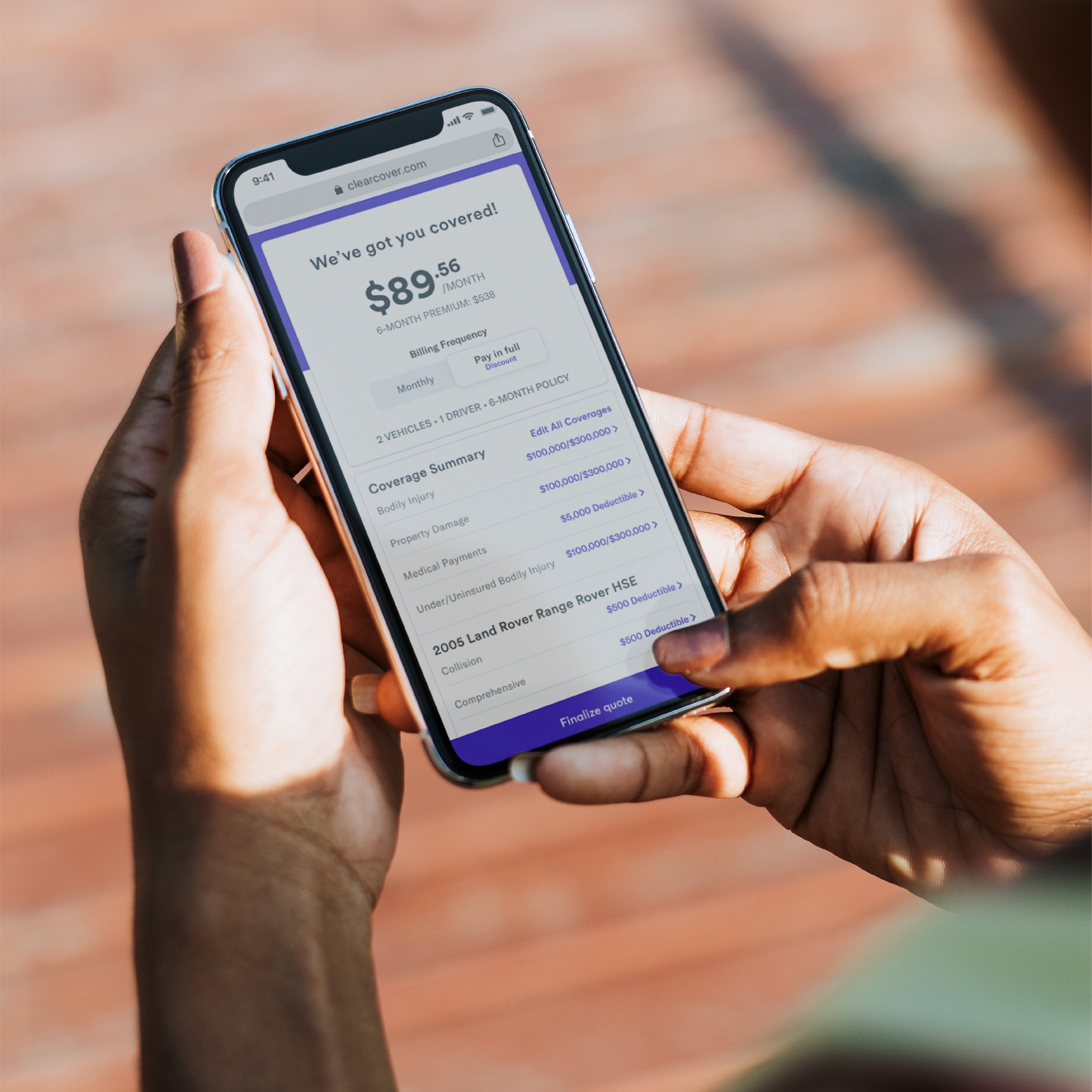How Long Do Car Insurance Claims Stay On Your Record?
Written by Team Clearcover
Car accidents can happen, even if you’re an incredibly careful, safe driver. And that’s what filing a car insurance claim is designed for–to help protect you against financial loss in the event of a covered accident.
After you experience an accident and notify your insurer, you may be wondering how long car insurance claims stay on your record. In this article, you’ll find out more. We’ll cover other common questions including:
Will your car insurance premium increase after an accident?
What factors cause an adjustment in your car insurance rates?
How long does a claim stay on your record?
How much will your car insurance premium increase?
You’ve Been in a Car Accident. Will Your Insurance Premium Increase?
Here’s what every driver wants to know: If you’re in an accident and file a car insurance claim, will your premium increase?
As with most car insurance questions, the correct answer here is, that it depends. Not all car insurance claims or accidents will cause your premium to go up.
Read What Is an Insurance Claim? to learn more about how claims work.
There are several factors that insurance companies look at that influence whether or not your premium will increase after an accident.
Factors Your Insurer Considers When Adjusting Your Rate
Prior to your policy’s renewal date, your insurance company re-evaluates your rate. Sometimes this leads to an increase in your premiums, and sometimes it doesn’t.
During your renewal period, your insurer will reevaluate your risk level as a driver (more on that below!) and review your claims and driving history to do so. This is where any past claims, accidents, and tickets can come into play in your adjusted premiums.
Learn more about car insurance rates increasing or decreasing and why it happens.
Some of the factors that cause an adjustment in your premiums—whether that’s an increase or a decrease—can include:*
If your policy includes accident forgiveness for first-time accidents
Good driver discounts that you currently receive
Your past record of incidents
Standard information, like your age and the age of your vehicle
If you’ve been in minor fender-benders or serious accidents that involve injuries or total losses
If you’re considered an at-fault driver vs. not-at-fault (both of these situations can lead to a change in rates)
*This isn’t a comprehensive list of what factors could affect your insurance rates and is included for educational purposes only. Every insurance company and state has its own rules around insurance rates, so talk with your agent or insurer to get the specifics on your policy.
We’ll cover some of these factors in more detail below—but first, an important note about risk.
What Influences Your Risk Level or Risk Class?
Your risk level or risk class as a driver is the category your driving habits and history fit into for insurance purposes.
Many things can influence your risk level for insurance purposes, including things like:
Your driving history and habits
How long you’ve been driving
If you’ve been consistently insured
If you’re a brand-new driver
For example, let’s say you’ve always had a clean and safe driving record. But in the last twelve months, you’ve had multiple speeding tickets and an accident. The recent change in your driving habits could increase the chances of your insurance company having to pay out claims on your behalf. And when you reach your policy’s renewal period, your risk level may be reevaluated by your insurance company.
How Long Does a Claim Stay On Your Record?
Typically, if you file a claim with your car insurance company, the claim will affect your insurance for three to five years. However, depending on the regulations in your state, a claim could impact your insurance for longer.
However, don’t let this keep you from filing a claim. That’s exactly what car insurance is for—to be there when you need it. And not all claims or accidents cause an increase in your car insurance premiums. (More on that next!)
How Fault Determination Affects Your Claim and Your Insurance
Okay, so we’re about to get a little technical here, but every driver needs to know that not every claim or car accident will cause an increase in their premiums.
And much of those increases or decreases in insurance rates are due to fault determination.
The determination of fault in an accident may determine which driver or party involved in the accident will pay higher insurance rates. This is why it’s absolutely essential to collect as much information about the incident as possible to immediately report it to your insurance company.
While it’s easy to assume there’s always a driver found 100% at fault in an accident, many car accidents aren’t that simple. Often, the drivers in an accident can share an at-fault percentage. Drivers can be found 51% at fault, 49% at fault, 25% at fault, and so forth. And sometimes, no driver is at fault at all. For example, if a tree falls on your vehicle during a terrible storm, this isn’t due to the actions of anyone specific driver or person.
Read Does Car Insurance Cover Storm Damage? to learn more about weather-related car insurance claims.
Does the Percentage of Fault Change How Long a Claim Affects Your Insurance?
Yes. The fault determination related to an accident can play into how long a claim can influence your car insurance premiums.
How Much Will My Car Insurance Premium Increase?
It’s hard to say exactly how much your car insurance premium will increase after an accident (if at all), because again, that depends on a variety of factors unique to you, your driving history, and your claim.
It’s fairly common for your car insurance rates to increase at your next renewal after an accident and then steadily decrease over time.
If you’re looking for a general idea of numbers, here’s a quick comparison: After a DUI, a driver’s insurance rates can go up, on average, about 74%, while the average premium increase after an accident is 41% and the average increase after a speeding ticket is only 21%, according to a Forbe’s Advisor analysis (1).
And the length of time that you’ll need to pay increased car insurance rates depends on your state’s laws, your insurance company’s rules, the severity of your accident, prior accident history, and more.
It’s important to note that if you get into an accident you should always file an insurance claim.
4 Ways Drivers Can Lower Their Insurance Premiums
The absolute best way to keep your car insurance rates low is to—of course—drive safely and avoid accidents. But even if you have a claim on your record, you can still explore ways to lower your insurance costs by:
Browsing for discounts
Shopping around to compare car insurance rates
Avoiding accidents and tickets to maintain a clean record
Discussing your policy coverage options with your insurance agent
Let’s take a closer look at the ways to possibly lower your car insurance premiums.
Browse for Discounts
If your rates go up after your next renewal period, take a moment to browse for common car insurance discounts available in your state.
Wondering how to get car insurance discounts? Check with your insurance company or insurance agent directly to make sure you’re getting all the ones you could be eligible for, like discounts for factory-installed safety features of your vehicle.
And guess what? When you check your car insurance price with Clearcover, we automatically apply the most eligible discounts directly to your initial quote. We make getting car insurance discounts incredibly easy.
Shop and Compare Rates
Listen, you work hard for your money, and you shouldn’t be paying more for car insurance than you need to. That’s why so many people (including insurance companies!) recommend shopping around and comparing car insurance rates every few years. It’s one of the easiest ways to save on car insurance, and you can switch car insurance companies at any time.
At Clearcover, we use smart technology and smart people to simplify car insurance—and that ends up saving us on operating costs. We pass those savings on to our customers, so you can get quality coverage at a great price. Learn more.
Discover what to look for when car insurance shopping by reading Is cheap car insurance good?
Maintain a Clean Driving Record
The most efficient (and rewarding) way to lower your car insurance premiums is to consistently practice safe driving habits.
This can help keep your car insurance costs lower throughout your driving lifetime, but it can also help you avoid accidents and tickets. Prevention is always the best policy!
Talk to an Agent About Making Changes to Your Coverage
Your car insurance rates can increase after an accident, but you can still adjust your coverages to help lower your insurance costs if needed.
The truth is, many people drive with too little car insurance coverage, but it’s also possible to have too much coverage for your unique situation and needs. Talking with an insurance agent can help you find the right policy and get the amount of coverage that’s the best fit for you.
Want some additional info right now? Check out the Clearcover car insurance Coverage Wizard. It’s a free tool that can help you discover what coverage might be right for you.
See What You Can Save With Clearcover
If your current premiums have gone up, it’s a good time to start shopping around for a better car insurance price.
Clearcover uses the power of technology to help you get affordable, reliable coverage. But we also have a lightning-fast claims process (most claims are paid out within a week and eligible claims can receive a payout in as little as seven minutes, making life a bit easier when you need your car insurance most.
Check your Clearcover price today to see what you can save.




